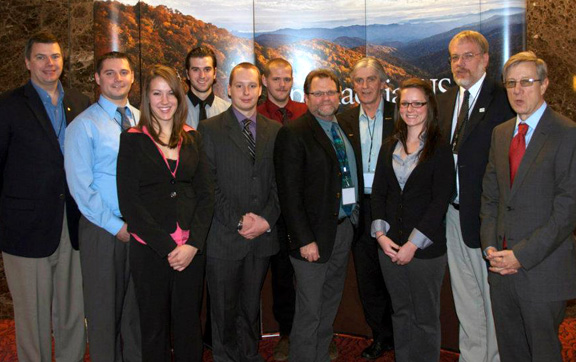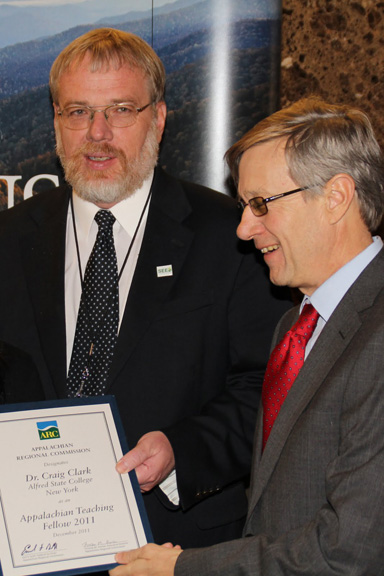
At a glance
 Clark, project manager on this grant, and architectural technology faculty members Jeffrey Johnston, William Dean, and Rex Simpson, accompanied six students who presented “Master Planning: Cuba, New York Phase II.”
Clark, project manager on this grant, and architectural technology faculty members Jeffrey Johnston, William Dean, and Rex Simpson, accompanied six students who presented “Master Planning: Cuba, New York Phase II.”

 Craig R. Clark, PE, dean, School of Applied Technology, Alfred State College, was recently named a 2011 Appalachian Teaching Fellow during ceremonies at the 11th annual Appalachian Teaching Project (ATP) conference in Washington, DC.
Craig R. Clark, PE, dean, School of Applied Technology, Alfred State College, was recently named a 2011 Appalachian Teaching Fellow during ceremonies at the 11th annual Appalachian Teaching Project (ATP) conference in Washington, DC.
On Dec. 2 and 3, 2011, approximately 150 students and faculty representing 14 Appalachian colleges and universities participated at the conference, presenting projects funded primarily by the Appalachian Regional Commission (ARC).
Clark, project manager on this grant, and architectural technology faculty members Jeffrey Johnston, William Dean, and Rex Simpson, accompanied six students who presented “Master Planning: Cuba, New York Phase II.”
In a preliminary phase of this project, Alfred State students developed site plans and a SWOT (strengths, weaknesses, opportunities, and threats) analysis for Allegany County, one of the poorest counties in New York state.
Based on this analysis, faculty selected Cuba, NY, as the focus area for the 2010 ATP project and generated nine different conceptual master plans. A new group of students reviewed this previous data and used it as a starting point for further exploration that included public meetings and a design charette. This community engagement was used to sift through the large number of previously explored ideas to resolve the strongest projects and establish a clear direction. It is anticipated that students will also be faced with new ideas from the stakeholders and will have to agree on a sensitive way to integrate them into the developing plans.
The students, all enrolled in the college’s baccalaureate architectural technology program, included James Allen, Syracuse; Cory Roberts, Stanley; Melanie Anderson, Grand Island; Ariel Plante, Chaumont; Michael Fingar, Clifton Park; and Matthew Mott, Springwater.
The Appalachian Teaching Project (ATP) gives college students the opportunity to engage in research projects that address endemic challenges facing Appalachian communities. Led by the Consortium of Appalachian Centers and Institutes, a coalition of 15 Appalachian-studies organizations, the program includes coursework and active research on issues related to building a sustainable future for Appalachian communities. Faculty and students at each participating institution design and carry out research projects tailored to the needs of targeted communities, many of which are in economically distressed counties. Project reports are presented at a conference held each December in Washington, DC.
The Appalachian Teaching Project (ATP) engages students and regional citizens in posing answers to the question, "How can we build a sustainable future for Appalachian communities?" The project teaches students and communities about the work of the Appalachian Regional Commission (ARC), its state and local partners, and the goals of the Commission's strategic plan.
Supported by ARC to help build student leadership capacity, the program teaches real-world leadership skills, taking students out of the classroom and into their communities. The research conducted helps guide communities toward local solutions that help solve significant problems in a sustainable way; and the research presentations challenge ARC to take a fresh look at issues and solutions in the Appalachian Region. Since the program's inception in 2001, research projects have addressed such issues as water quality, local leadership development, the environment, and regional history. Topics for 2011 included sustainable agriculture and food systems, building community through public art, rural governance and strategic planning, heritage tourism, and mapping and promoting community assets.
The ATP is administered by the Center for Appalachian Studies and Services at East Tennessee State University (ETSU). Fourteen institutions from 10 Appalachian states participated in the 2011 Appalachian Teaching Project: Alfred State College (New York); Auburn University (Alabama); Appalachian State University (North Carolina); East Tennessee State University; Emory and Henry College (Virginia); Fairmont State University (West Virginia); Frostburg State University (Maryland); Morehead State University (Kentucky); Shawnee State University (Ohio); Radford University (Virginia); Virginia Polytechnic Institute and State University; Southeast Kentucky Community and Technical College; the University of Pittsburgh at Bradford (Pennsylvania); and the University of Tennessee.
The ATP gives college students the opportunity to engage in research projects that address endemic challenges facing Appalachian communities and to present the results of their research to an audience of their peers, ARC staff and administrators, and other invited guests. Presentations at the 2011 conference highlighted topics including sustainable agriculture and food systems, building community through public art, rural governance and strategic planning, heritage tourism, and mapping and promoting community assets.
AHE Network centers provide grants of approximately $2,000–$10,000 to high schools in their service areas via a competitive process. The schools then implement low-cost, high-impact activities and services to encourage participation in postsecondary education, such as college campus and worksite visits, financial aid training, occupational interest surveys, and assistance with college selection and application processes. Recently the AHE Network centers began developing strategies to track college completion rates for the students they serve.
The centers are supported by a technical assistance, training, and support team that helps them implement their activities and has formed a peer learning network to foster both staff professional development and institutional development and sustainability.
 Pictured in photo, l-r, William Dean, professor and chair, Alfred State College Department of Architecture and Design; Allen; Plante; Fingar; Roberts; Mott; Rex Simpson, professor, ASC Department of Architecture and Design; Jeffrey Johnston, assistant professor, ASC Department of Architecture and Design; Anderson; Craig Clark, dean, ASC School of Applied Technology; and Earl Gohl, ARC federal co-chair.
Pictured in photo, l-r, William Dean, professor and chair, Alfred State College Department of Architecture and Design; Allen; Plante; Fingar; Roberts; Mott; Rex Simpson, professor, ASC Department of Architecture and Design; Jeffrey Johnston, assistant professor, ASC Department of Architecture and Design; Anderson; Craig Clark, dean, ASC School of Applied Technology; and Earl Gohl, ARC federal co-chair.
